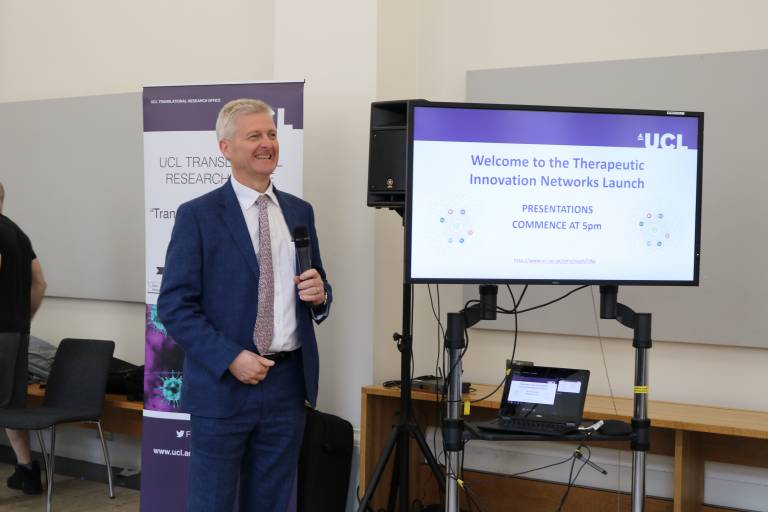Members of the UCL community gathered on 12th July 2018 to celebrate the launch of the UCL Therapeutic Innovation Networks (TINs).

The event brought together academics with an interest in therapy development.
The TINs are multidisciplinary networks, connecting researchers in major therapeutic modalities from across UCL and partner NIHR Biomedical Research Centres. Their purpose is to maximise the translation of disease-related research into high-quality therapeutic interventions quickly and efficiently for the benefit of patients.
Introducing the TINs launch, Prof David Lomas, Vice-Provost (Health) explained that the TINs are “an essential component of our translational strategy to drive improvements in human health and wealth through our research. Funding calls are becoming ever more collaborative and complex and it is paramount that our communities are networked and poised to respond”.
The TINs are:
· Biologics – Chair: Prof Paul Dalby
· Cell, Gene and Regenerative Medicines – Co-chairs: Prof Emma Morris, Prof Adrian Thrasher
· Devices – Chair, Dr Rebecca Shipley
· Diagnostics – Chair, Dr Rebecca Shipley
· Repurposing – Co-chairs, Prof Oscar Della Pasqua, Dr Richard Angell
· Small Molecule – Chair, Prof Bart Vanhaesebroeck
The Cell, Gene and Regenerative Medicines (CGRM) TIN is the longest-established and has already achieved results in promoting the extensive capabilities of the community, sharing expertise and mobilising around strategic issues. The Translational Research Office (TRO) provides strategic support to the TINs and are optimistic that the other networks will mirror the success of the CGRM TIN.
The evening concluded with networking drinks, giving attendees an opportunity to meet colleagues and spark collaborations. Collaboration is integral to UCL’s success and we are continually looking to develop new multidisciplinary alliances with patient-centric organisations.
The event was hosted by the Translational Research Office (TRO), which provides support for translational research, industrial partnerships and drug discovery.
If you are interested in partnering with one or more of the TIN communities around a specific therapeutic modality, please contact us at https://www.ucl.ac.uk/slms/ovph/TINs/Contact
 Close
Close

